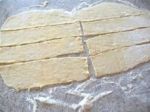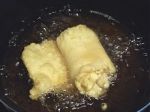Purim cakes
Once upon a time, in the year 3392, there was a very young and beautiful queen named Esther. Seeing her people in great danger, she successfully foiled a plot instigated by the evil advisor of the King of Babylong, Aman.
Since that time, it's been customary in Jewish lands to joyfully commemorate the event, preparing cakes for the whole family. Purim means "destiny."
My grandmother made tons of pastries for this occasion, as varied as they were good. It was a different time. "Destiny" means that things are handed down through the heart and that traditions are carried on out of love.
Of all Tunisian sweets, these little "ear" cakes are my favorite. I can still see my grandmother frying them with two forks: quite an art!
Sophie Gozlan
Step by step

Combine the eggs, water, baking powder and oil.
Gradually blend in the flour to make a soft dough.
Roll out on a floured surface.
Cut into very thin strips, about 6 cm (2 1/2") wide and 20 cm (8") long.

Fry each strip by rolling it around a fork as the dough fries, using a second fork to roll it around itself.

Once the technical work of frying is completed, prepare the syrup:
Combine all the ingredients in a small saucepan.
Bring to a boil to form a thick syrup, then pour over the pastries.
In special collaboration with Sophie Gozlan, a Tunisian living in Paris who presents some of her grandmother's classic recipes.

-

 Recipes
Recipes
-

 Products
Products
-

 Entertaining
Entertaining
-

 Chefs
Chefs
-

 Hints & Tips
Hints & Tips
-

 Glossaries
Glossaries









